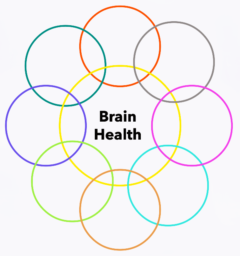
Research is clarifying how nutrition plays a fundamental role in brain health and cognitive function. Dietary choices can support or harm brain health over time. To lower the risk of cognitive decline and Alzheimer’s disease, a diet rich in certain foods and adherence to specific dietary practices can be highly beneficial by reducing inflammation and oxidative stress, and by promoting the growth of new brain cells and recycling waste products and damaged cells.
Dietary changes can be a powerful tool in promoting long-term cognitive health. Foods rich in antioxidants, healthy fats, and other brain-supporting nutrients have been linked to slower cognitive decline and a lower risk of Alzheimer’s. Leafy greens, fatty fish, berries, nuts, and seeds are examples of brain-boosting foods. The right choices can make a world of difference. Eating smart not only benefits our waistline but also our minds.
By understanding how food impacts our brain health, we can take proactive steps to nourish our minds. It’s about setting ourselves up for a future where we are mentally sharp and resilient against cognitive decline.
Nutrient-Packed Foods to Combat Cognitive Decline
Leafy green vegetables such as kale, spinach, and bok choy are excellent for brain health. They are high in antioxidants, folate, and phytonutrients, which work together to protect brain cells and promote cognitive function. Aim to include a variety of these vegetables in your meals daily.
Non-starchy vegetables like broccoli, cauliflower, and Brussels sprouts are also powerful allies in brain health. They are packed with fiber, vitamins, minerals, and antioxidants, contributing to overall wellness and reducing inflammation, which has been linked to cognitive decline.
Fatty fish, including salmon, mackerel, and herring, is another key food category. These fish are rich in omega-3 fatty acids (DHA) and vitamin B12, both of which are essential for maintaining brain structure and function. Regularly consuming fatty fish can support memory and reduce the risk of cognitive disorders.
Berries, particularly blueberries, strawberries, and raspberries, are among the best fruits for brain health. They contain flavonoids and anti-inflammatory compounds that help support memory and cognitive function. Including a handful of berries in your diet is a delicious way to nourish your mind.
Nuts and seeds, such as walnuts, almonds, flaxseeds, and chia seeds, are perfect for brain health. They offer healthy fats, protein, and antioxidants that enhance memory and cognitive abilities. Snacking on a mixture of nuts and seeds or adding them to your meals can provide lasting cognitive benefits.
Incorporating these foods into your diet can support long-term brain health. Consistently choosing nutrient-dense options will help safeguard your cognitive function against decline and reduce the risk of Alzheimer’s disease.
Healthy Fats and Their Impact on Brain Health
Healthy fats play a crucial role in maintaining brain health and function. Incorporating these fats into your diet can help protect your brain from cognitive decline and support overall mental well-being.
Olive oil is one of the healthiest fats you can include in your diet. It’s known for its ability to reduce cholesterol and improve the blood-brain barrier, helping to keep harmful substances out of your brain. Using olive oil as a primary fat for cooking and dressing salads is an excellent way to get these benefits.
Avocados are another fantastic source of healthy fats. They are packed with antioxidants and monounsaturated fats, both of which are linked to improved brain function. Adding avocado slices to your sandwiches, salads, or smoothies can be a tasty way to boost your intake of these beneficial fats.
Coconut oil is gaining attention for its potential brain health benefits. It may support brain function by promoting ketosis and improving metabolism. Incorporating coconut oil into your cooking or smoothies can be a simple way to tap into these benefits.
Poultry, including chicken and turkey, is a lean protein source that also supports brain health. These meats are rich in vitamins and minerals essential for cognitive function. Including a variety of lean proteins in your meals ensures that you are providing your brain with the necessary nutrients to remain sharp and healthy.
Incorporating these healthy fats into your daily diet can make a significant difference in your brain health over time. Choosing the right fats not only supports your cognitive function but also helps in maintaining overall physical health.
Dietary Practices to Support Brain Health
Adopting specific dietary practices can significantly bolster cognitive health and lower the risk of Alzheimer’s disease. Incorporating these into your daily routine can create a foundation for long-term brain wellness.
Following a Mediterranean diet is a great approach. This diet emphasizes plant-based foods, healthy fats, and fish, while including moderate amounts of poultry, eggs, dairy, and red wine. Studies show that this diet is associated with reduced cognitive decline and a lower risk of Alzheimer’s disease. Make your meals colorful with a variety of fresh vegetables, fruits, and whole grains, and use olive oil as your main fat source.
The MIND diet, a blend of the Mediterranean and DASH diets, places a strong emphasis on leafy greens, berries, nuts, whole grains, fish, beans, and olive oil. It limits red meat, butter, cheese, sweets, and fried foods. Research suggests that following the MIND diet can significantly slow brain aging and reduce the risk of Alzheimer’s.
Intermittent fasting is another practice gaining traction for its potential brain health benefits. The KetoFLEX 12/3 diet recommends 12-hour fasting periods, with at least 3 hours of fasting before bedtime. This approach may improve brain health by allowing the body time to repair oxidative damage and manage its energy sources more efficiently.
Limiting processed foods is a vital practice for brain health. Foods high in refined sugars, trans fats, and excessive salt are linked to inflammation and cognitive decline. Instead, opt for whole, minimally processed foods that provide essential nutrients without harmful additives.
Incorporating prebiotics and probiotics into your diet can also support brain health. Fermented foods like yogurt, sauerkraut, and kimchi, alongside prebiotic-rich foods such as leeks and asparagus, support gut health, which is closely linked to cognitive function.
Embrace a Lifestyle for Long-Term Brain Health
When it comes to maintaining brain health and reducing the risk of Alzheimer’s disease, the choices we make daily, including the foods we eat and our overall lifestyle, matter greatly. Avoiding certain foods and beverages known to be detrimental to cognitive function is just as important as embracing brain-boosting options.
Sugary foods and drinks are among the biggest culprits. High sugar intake can lead to inflammation and insulin resistance, both of which are linked to cognitive decline. Cutting back on sweets, sodas, and other sugary snacks can make a substantial difference.
Trans fats, often found in fried and processed foods, should also be minimized or eliminated. These unhealthy fats contribute to inflammation and are associated with an increased risk of Alzheimer’s disease. Switching to healthier fats like those from olive oil, avocados, nuts, pastured eggs, and grass-fed meat provide the brain with better fuel.
Excessive salt consumption is another factor to watch out for. High salt intake can lead to high blood pressure, which negatively impacts brain health. Reducing the amount of salt in your diet by avoiding heavily processed foods and cautiously seasoning your meals can help maintain cognitive function.
Alcohol is a neurotoxin, meaning it kills brain cells. Moderate alcohol consumption, particularly red wine, has been linked to some brain health benefits due to its flavonoid content. However, excessive alcohol intake can have the opposite effect, leading to long-term cognitive problems. It’s important to drink in moderation, if at all, and choose brain-friendly options when you do.
By making mindful dietary choices and avoiding foods that negatively impact brain health, you can take active steps to support long-term cognitive function. Combining these habits with the nutrient-packed foods and dietary practices discussed earlier can help fortify your brain against Alzheimer’s disease and promote overall mental well-being.



